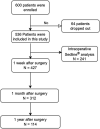Preoperative mild cognitive impairment as a risk factor of postoperative cognitive dysfunction in elderly patients undergoing spine surgery
- PMID: 38282693
- PMCID: PMC10811182
- DOI: 10.3389/fnagi.2024.1292942
Preoperative mild cognitive impairment as a risk factor of postoperative cognitive dysfunction in elderly patients undergoing spine surgery
Abstract
Introduction: Any persistent degree of cognitive impairment in older adults is a concern as it can progress to dementia. This study aimed to determine the incidence and risk factors for early postoperative cognitive dysfunction (POCD) in elderly patients undergoing spine surgery.
Methods: Patients were enrolled from a previous prospective observational study after screening for normal cognitive function using the Mini Mental State Examination (MMSE). Cognitive function was evaluated before surgery and at 1 week, month, and year post-surgery using MMSE and Montreal Cognitive Assessment scores (MoCA). Mild cognitive impairment (MCI) was determined using the MoCA scores adjusted for age. POCD was defined as a drop of three or more points on the MMSE 1 week post-surgery. Multivariate logistic analysis was performed to identify POCD risk factors.
Results: A total of 427 patients were included. Eighty-five (20%) had pre-existing MCI. The MCI group showed lower MoCA scores at each time point (baseline, 1 week after surgery, 1 month after surgery, 1 year after surgery) compared to the non-MCI group. Those in the MCI group had a higher rate of admission to intensive care unit after surgery, postoperative delirium, and POCD 1 week post-surgery, than those in the non-MCI group (16.5% vs. 6.7%, p = 0.008; 27.1% vs. 15.8%, p = 0.024; and 18.8% vs. 8.2%, p < 0.001, respectively). Among them, 10.3% were assessed for POCD on postoperative day 7 and self-reported poor social roles and physical functioning 1 week postoperatively.
Conclusion: Preoperative MCI was seen in ~20% of surgical patients aged >70 years. POCD was seen in ~20% of patients with pre-existing MCI, and ~ 10% of those without. Benzodiazepine use, significant comorbidities, pre-existing MCI, and depressive tendencies were risk factors for POCD.
Keywords: aged; cognitive dysfunction; delirium; neurocognitive disorders; perioperative care; postoperative cognitive complications.
Copyright © 2024 Park, Kim, Ha, Kim, Yi and Koo.
Conflict of interest statement
The authors declare that the research was conducted in the absence of any commercial or financial relationships that could be construed as a potential conflict of interest.
Similar articles
-
Early postoperative neurocognitive complications in elderly patients: comparing those with and without preexisting mild cognitive impairment- a prospective study.BMC Geriatr. 2024 Jan 22;24(1):84. doi: 10.1186/s12877-024-04663-5. BMC Geriatr. 2024. PMID: 38253999 Free PMC article.
-
Influence of Living Arrangements on Perioperative Cognitive Dysfunction Among Elderly Patients.J Craniofac Surg. 2025 Jul-Aug 01;36(5):1737-1742. doi: 10.1097/SCS.0000000000011221. Epub 2025 Mar 18. J Craniofac Surg. 2025. PMID: 40100168
-
Postoperative cognitive dysfunction in older surgical patients associated with increased healthcare utilization: a prospective study from an upper-middle-income country.BMC Geriatr. 2022 Mar 16;22(1):213. doi: 10.1186/s12877-022-02873-3. BMC Geriatr. 2022. PMID: 35296258 Free PMC article.
-
Is the Montreal Cognitive Assessment (MoCA) test better suited than the Mini-Mental State Examination (MMSE) in mild cognitive impairment (MCI) detection among people aged over 60? Meta-analysis.Psychiatr Pol. 2016 Oct 31;50(5):1039-1052. doi: 10.12740/PP/45368. Psychiatr Pol. 2016. PMID: 27992895 Review. English, Polish.
-
Postoperative Cognitive Dysfunction and Noncardiac Surgery.Anesth Analg. 2018 Aug;127(2):496-505. doi: 10.1213/ANE.0000000000003514. Anesth Analg. 2018. PMID: 29889707 Review.
Cited by
-
Comparison of remimazolam tosylate and propofol in hemodynamic stability, postoperative cognitive function, and recovery in general anesthesia combined with regional nerve blocks: a retrospective cohort study.BMC Anesthesiol. 2025 Mar 15;25(1):126. doi: 10.1186/s12871-025-02981-8. BMC Anesthesiol. 2025. PMID: 40089668 Free PMC article.
-
Preoperative quantitative quadriceps muscle ultrasound to predict POD for gastrointestinal surgery in older patients.BMC Gastroenterol. 2025 Mar 24;25(1):198. doi: 10.1186/s12876-025-03782-6. BMC Gastroenterol. 2025. PMID: 40128647 Free PMC article.
-
The intersection of delirium and long-term cognition in older adults: the critical role of delirium prevention.J Neurol. 2025 May 6;272(6):381. doi: 10.1007/s00415-025-13104-1. J Neurol. 2025. PMID: 40329080 Review.
References
-
- Arevalo-Rodriguez I., Smailagic N., Roqué-Figuls M., Ciapponi A., Sanchez-Perez E., Giannakou A., et al. . (2021). Mini-mental state examination (MMSE) for the early detection of dementia in people with mild cognitive impairment (MCI). Cochrane Database Syst. Rev. 2021:CD010783. doi: 10.1002/14651858.CD010783.pub3, PMID: - DOI - PMC - PubMed
-
- Au E., Thangathurai G., Saripella A., Yan E., Englesakis M., Nagappa M., et al. . (2023). Postoperative outcomes in elderly patients undergoing cardiac surgery with preoperative cognitive impairment: a systematic review and Meta-analysis. Anesth. Analg. 136, 1016–1028. doi: 10.1213/ANE.0000000000006346, PMID: - DOI - PubMed
-
- Carcelén-Fraile M. D. C., Llera-Delatorre A. M., Aibar-Almazán A., Afanador-Restrepo D. F., Baena-Marín M., Hita-Contreras F., et al. . (2022). Cognitive stimulation as alternative treatment to improve psychological disorders in patients with mild cognitive impairment. J. Clin. Med. 11:3947. doi: 10.3390/jcm11143947, PMID: - DOI - PMC - PubMed
LinkOut - more resources
Full Text Sources
Medical


